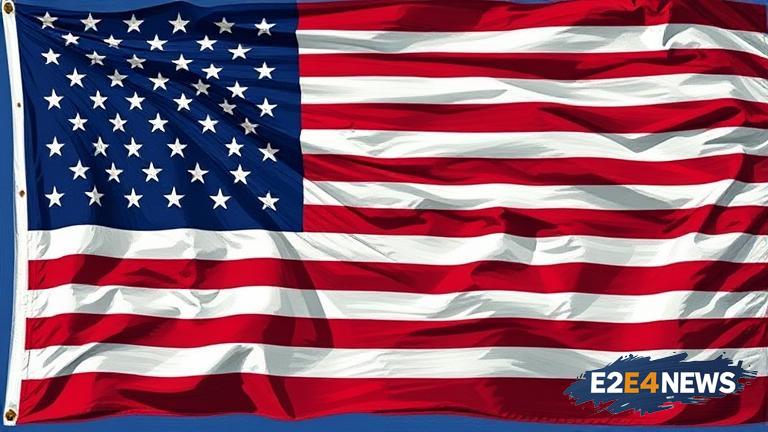President Trump has recently ordered a crackdown on US flag burning and desecration, sparking a heated debate about free speech and its limits in the United States. The order has been met with criticism from civil liberties groups and free speech advocates, who argue that it infringes upon the fundamental right to express dissent and protest. The US flag is a symbol of national pride and unity, but it has also been a target of protest and dissent throughout American history. Burning or desecrating the flag is considered a form of symbolic speech, protected under the First Amendment to the US Constitution. However, the Supreme Court has also recognized that the government has a legitimate interest in protecting the flag from desecration. The issue is complex and contentious, with some arguing that flag burning is a form of hate speech that should be prohibited, while others see it as a necessary form of protest and free expression. The Trump administration’s order has been seen as an attempt to suppress dissent and limit free speech, particularly in the context of protests and demonstrations. The order has also raised concerns about the potential for abuse of power and the erosion of civil liberties. Free speech advocates argue that the order is unconstitutional and that it undermines the principles of democracy and freedom of expression. The American Civil Liberties Union (ACLU) has condemned the order, stating that it is a clear attempt to suppress dissent and limit free speech. The ACLU has also argued that the order is based on a flawed understanding of the First Amendment and the principles of free speech. The order has also been criticized by human rights groups, who argue that it is a form of censorship and a threat to democracy. The US has a long history of protecting free speech, even when it is unpopular or controversial. The Supreme Court has consistently recognized the importance of free speech in a democratic society, and has struck down laws and regulations that attempt to limit or suppress it. However, the Trump administration’s order has raised concerns that this tradition of protecting free speech is under threat. The order has also sparked a wider debate about the role of free speech in American society, and the limits of acceptable protest and dissent. Some argue that flag burning is a form of hate speech that should be prohibited, while others see it as a necessary form of protest and free expression. The issue is complex and contentious, and it is likely to continue to be a source of debate and controversy in the months and years to come. The Trump administration’s order has also raised concerns about the potential for abuse of power and the erosion of civil liberties. The order has been seen as an attempt to suppress dissent and limit free speech, particularly in the context of protests and demonstrations. The US has a long history of protecting free speech, even when it is unpopular or controversial. The Supreme Court has consistently recognized the importance of free speech in a democratic society, and has struck down laws and regulations that attempt to limit or suppress it. The order has also sparked a wider debate about the role of free speech in American society, and the limits of acceptable protest and dissent. The issue is complex and contentious, and it is likely to continue to be a source of debate and controversy in the months and years to come. The US flag is a symbol of national pride and unity, but it has also been a target of protest and dissent throughout American history. Burning or desecrating the flag is considered a form of symbolic speech, protected under the First Amendment to the US Constitution. The Supreme Court has also recognized that the government has a legitimate interest in protecting the flag from desecration. However, the Trump administration’s order has been seen as an attempt to suppress dissent and limit free speech, particularly in the context of protests and demonstrations. The order has also raised concerns about the potential for abuse of power and the erosion of civil liberties. The US has a long history of protecting free speech, even when it is unpopular or controversial. The Supreme Court has consistently recognized the importance of free speech in a democratic society, and has struck down laws and regulations that attempt to limit or suppress it. The order has also sparked a wider debate about the role of free speech in American society, and the limits of acceptable protest and dissent. Some argue that flag burning is a form of hate speech that should be prohibited, while others see it as a necessary form of protest and free expression. The issue is complex and contentious, and it is likely to continue to be a source of debate and controversy in the months and years to come. The Trump administration’s order has also raised concerns about the potential for abuse of power and the erosion of civil liberties. The order has been seen as an attempt to suppress dissent and limit free speech, particularly in the context of protests and demonstrations. The US has a long history of protecting free speech, even when it is unpopular or controversial. The Supreme Court has consistently recognized the importance of free speech in a democratic society, and has struck down laws and regulations that attempt to limit or suppress it. The order has also sparked a wider debate about the role of free speech in American society, and the limits of acceptable protest and dissent. The issue is complex and contentious, and it is likely to continue to be a source of debate and controversy in the months and years to come.
